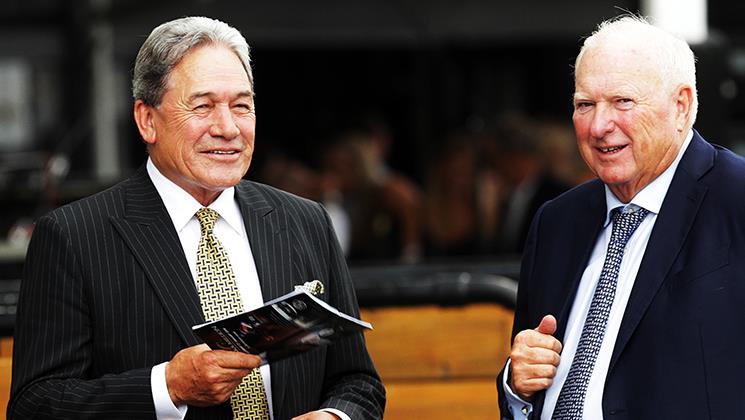
Racing Reform Bill passes third reading
Deputy Prime Minister and Racing Minister Winston Peters (left) with Sir Peter Vela Photo: Trish Dunell
“The revitalisation of this industry is underway,” said Racing Minister Winston Peters as the Racing Reform Bill passed its third and final reading in Parliament on Thursday.
The Bill, which comes into force on 1 July, opens the starting gate for the transition of the New Zealand Racing Industry into a financially sustainable future.
The Bill reconstitutes the New Zealand Racing Board as the Racing Industry Transition Agency, (RITA).
RITA will have a new membership and a legislative mandate to manage the changes needed to revitalise the industry as well as to carry out business-as-usual functions.
The Bill also addresses the industry’s need for additional revenue. The totalisator duty currently paid to the Crown will be phased out, with the revenue returned to the industry and a portion retained for harm minimisation.
The Bill also introduces two new charges on overseas betting operators to help ensure they contribute to the New Zealand racing and sports codes from which they benefit.
The Bill permits RITA to offer betting on a wider range of sports where an agreement is reached with Sport New Zealand.
The formula for distributing payments to sporting and racing codes will be placed into regulations, so they can be more readily changed when needed by the industry.
“This Bill is an important first step. However, while the race has begun we are still far from the finish line,” said Peters, who intends to introduce a second Bill later this year to build on these initial reforms.
The second Bill will establish post-transition governance arrangements and other changes deemed necessary to ensure the revitalisation of the industry.
“As a whole, these reforms serve to emphasise the value of racing in New Zealand,” Peters said.
“The Racing Reform Bill lays out an opportunity to deliver real results, to grow this industry for the benefit of our regions, our communities, and our economy.”
What is the bill about?
The Messara Report was commissioned in April 2018 to look at the status of the thoroughbred racing industry in New Zealand and provide recommendations for possible reform of the industry.
The Racing Reform Bill is the first of two law-making responses that would put into effect some of the report’s key proposals. These proposals would drive the changes needed to build a sustainable future for the racing industry.
What does the bill mean?
The bill seeks to amend the Racing Act 2003 and the Gaming Duties Act 1971 to bring into effect a period of transition and various financial changes to the industry.
The bill aims to do this by:
Restructure
The New Zealand Racing Board will change to the Racing Industry Transition Agency Board (RITA). RITA will be responsible for managing change in the industry and for its everyday functions, as the industry moves through its one-year transition period to a financially sustainable future.
Offshore betting
The bill would allow for the collecting of revenue from overseas betting operators that provide betting services to people living in New Zealand.
Phased totalisator duty repeal
The totalisator duty will progressively reduce over a three-year period. At the end of the period, it will look to repeal the requirement to pay the totalisator duty.
Makes changes to the distribution of racing and sports revenue
The bill would remove distribution formulas for the racing industry and minimum payments formulas for New Zealand national sporting bodies. The bill would allow for both to be determined by regulations.
Sports betting
The bill would permit relevant sporting bodies to offer betting products on sports not represented by a domestic national sporting organisation. This change will help New Zealand’s racing industry to offer betting on a wider range of sports.
Who might the bill affect?
The New Zealand racing industry
The New Zealand Racing Board
National and international betting operators
Sports totalisator agencies
National sporting organisations
People who use betting facilities









